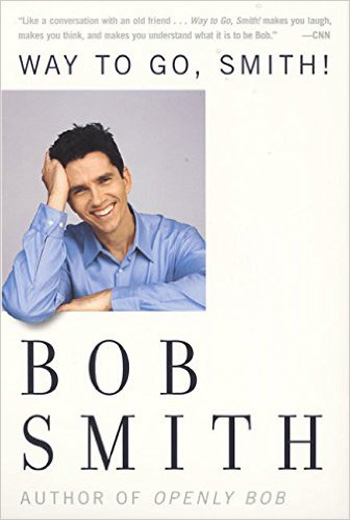 Way to Go, Smith!
Way to Go, Smith!
by Bob Smith
Published by Harper Perennial
Published November 7, 2000
History (memoir)
304 pgs. • Find on Amazon.com
Reviewed by Stephen O. Murray
June 19, 2001
The genial gay stand-up comedian Bob Smith followed up Openly Bob with a second and more unified collection of essays. Although he still sometimes drives a metaphor far into the ground, there are few failed jokes in Way To Go, Smith!
Like the previous book, Way To Go, Smith! is framed by a pair of essays on one subject: visiting the childhood home and his companion of ten years, Tom, breaking up with him.
The first chapter is about the pathologically extreme division of community property, the last about being 40, gay, and trying to figure out dating. A friend tells him that dating is like riding a bicycle: one does not forget how. Bob’s opinion is that it is “more like riding a tricycle. It was something I was still capable of doing but I felt I had outgrown it and doing it now felt somewhat undignified and embarrassing.”
There is plenty of absurdity for him to report about his divorce and hunting for a new mate (he wishes we had moved up the evolutionary ladder from hunter-gatherer to agriculture), but he does not try to cover up his sadness with jokes. He shapes accounts of his dismay and awkwardness into wry stories.
Between the frames, the essays recall growing up gay (while being terrified of recognized by others as gay, or, even more horrifying, queer). One recalls an implacable grandmother who had her husband take tranquilizers, telling him they were vitamins:
It was typical of her approach to problem solving that she believed that the external source of her nervousness should be on medication, not she herself. It’s contrary to most legal and ethical treatments for achieving mental health but prescribing drugs to the people surrounding the person with emotional problems is tempting to contemplate. Do you feel depressed? Have you ever considered putting your family and friends on antidepressants? Who knows? Maybe they’ll begin to be happier and your spirits will improve when they start treating you better.
There is a memory of a male grade school teacher whom Bob came to realize had a male lover. The title story takes its title from what classmates said when he fainted at two classroom movies about internal processes. I particularly enjoy one in which Bob takes out his high school yearbooks (he graduated in 1976, a moment of truly hideous fashions). He decodes what friends wrote at the time and relates several adolescent adventures, including visiting the home of the school’s pot dealer. This guy’s mother sold accessories (pipes, etc.).
The harshest chapter is about a former high-school classmate who went on to murder a woman, having stabbed Bob with a pen. This chapter and the one on yearbook scribblings have some apt analyses of male-bonding and competitive displays, including ready wit, which the child Bob Smith already had. His recollection of meeting the future murderer when they were both nine years old rings very true to me: “I was initially friendly toward him because he passed my low standards of companionship: he was my age and had nothing to do that day. Like most boys I was fairly undiscriminating about choosing my friends. I thought I shared a common interest with another boy if we both liked candy.” And “as a boy I didn’t pry into my friends’ private lives. I didn’t care who or what my friends slept with; stuffed animals or security blankets, it was none of my business. And I didn’t care what they did in bed—as long as they didn’t wet it when they slept over.” The last is overly ingenuous, but…
The most powerful chapter is recollections at the hospital bedside of his father who has nearly drunk himself to death. Titled “Our Fathers,” much of it is about his father taking Bob to mass, invariably leaving before communion was served—and much earlier when Bob’s pet hamster chewed its way out of a pocket and crawled out his sleeve. Bob recalls the mystification of Latin masses (“Pater noster…”), and with a relatively light touch expresses his horror at the kind of father who would have his son crucified—a judgmental and controlling father quite unlike his own mysterious but protective father.
In short, Bob Smith takes on some heavy stuff, not least his forbearers. There is no sex and a lot of family in both books. I came away from reading them liking him and his parents and wishing that all three of them could have been happier. There is a lot of acute analysis of his family and the Buffalo, New York milieu in which he grew up, and only sporadic cuteness. I think that the two books both entertain and instruct.
Originally published by epinions 19 June 2001
©2001, 2016, Stephen O. Murray
P.S. Fom a review of Treehab (University of Winsconsin Press, 2016) I learned that Smith was diagnosed with ALS (Lou Gehrig disease) in 2007 and can no longer speak.

